- Home
- Elizabeth Strout
Amy and Isabelle Page 3
Amy and Isabelle Read online
Page 3
Isabelle rose and wrapped the leftover part of her hamburger in wax paper and put it in the refrigerator. She washed the plates, red-stained water from the beets swirling into the white sink. Only when the dishes were done and put away did she wash the Belleek china creamer. She washed it carefully, and dried it carefully, then put it far back in the cupboard, where it couldn’t be seen.
She heard Amy come out of her bedroom and move to the top of the stairs. Just as Isabelle was about to say that she didn’t want the Belleek creamer used anymore, that it was too special a thing and too apt to get broken, Amy called down the stairs, “Mom, Stacy’s pregnant. I just wanted you to know.”
Chapter
2
THE RIVER DIVIDED the town in two. On the east side Main Street was pleasant and wide, curving past the post office and town hall until it came to a place where the river was only a quarter mile wide. There the street became a bridge that had a spacious sidewalk along each side. If you drove or walked west over the bridge and looked up the river, you could see the back end of the mill and part of its dark underbelly as well, built out over the granite slabs of foam-sprayed rocks. When you came off the bridge there was a small park at the river’s edge, and it was here the sun could set so stridently in wintertime, slicing pinkish golds along the horizon, with the bare elms at the edge of the bank seeming austere and dark, emboldened. But hardly anyone went into the park for long. The park itself was nothing much to look at, having little more than a broken swing set and a few scattered benches, many of them missing a slat from their seats. Mostly it was teenagers that you’d find there, perching themselves tensely on the edge of the benches, hunching their shoulders against the cold, cupping bare hands around cigarettes; sometimes in the dusk you could find a small group passing a joint to each other, inhaling, throwing surreptitious glances up toward Mill Road.
Mill Road was what Main Street became once it crossed over the bridge, and while Mill Road did lead eventually to the mill, it first wound itself through a section of stores that included an old A&P with sawdust on its floors, a furniture outlet with faded couches in the windows, a few clothing stores and coffee shops, a pharmacy that for years had had the same display of a dusty plastic African violet sitting in the middle of a bedpan.
The mill was just beyond. Even though the river there was at its ugliest—churning and yellow and sudsy—the mill itself, built in red brick a century before, had a certain complacent elegance to the way it sat, as though it had long ago accepted itself as the center of this town. For the workers whose families had come down from Canada a generation before, the mill was in fact the center of the town; it was the center of their lives, and their houses were not far away, scattered in neighborhoods on narrow roads where small grocery stores advertised beer in the windows with blinking blue lights.
This part of town was known as the Basin, though no one seemed to remember why anymore, and the houses here were often loose-looking and large, with three stories, one apartment to each floor, and usually a tilting front porch. But there were some single-family homes as well, shingled and small, with garage doors left always open, showing a confluence of tires, bicycles, fishing rods. A number of these houses were painted turquoise or lavender or even pink, and there might be a statue of the Virgin Mary in a front yard, or a bathtub filled with petunias and dirt, becoming in winter a serene mound of snow. In winter, some people put plastic reindeer or angels in the snow and decorated them with blinking lights. A dog, chained outside in the cold, sometimes barked at the reindeer all night, but no one thought to call the owner or the police, as they would certainly have done across the river, where people expected, or demanded, a good night’s sleep.
This other side of the river, known as Oyster Point, was where the few doctors and dentists and lawyers of Shirley Falls lived. The public school was here, and the community college, built fifteen years earlier out toward Larkindale’s field, and the Congregational church was here as well. A simple white church with a simple white steeple, very different from the huge Catholic church with its stained-glass windows, in the Basin up on a hill. It was on this Protestant, Oyster Point side of the river that Isabelle Goodrow had very deliberately chosen to live. Had she been forced, for whatever reason, to consider moving into the top-floor apartment of some lavender house with the Virgin Mary standing blank-eyed out front, Isabelle would have refused. She would simply have gone back up the river to the town she had left. But luck (she had sometimes at first thought God) had seen to it that the carriage house of the old Crane estate had been available to rent, and so it was there, on the outskirts of Oyster Point, beneath the woody hills and fields out on Route 22, that she had brought her small daughter to live.
The house, small and poorly insulated, turned out to be hot in the summer and cold in the winter, but otherwise it suited their needs. Built originally at the turn of the century as a small barn for a few horses, it had later been converted into a caretaker’s cottage, and then the fire happened—the main house of the Crane estate had burned to the ground. It was never determined exactly what had caused the fire. Probably faulty wiring. But there were stories told of the Honorable Judge Crane’s having had a mistress who set fire to his house one night. Another variation had the judge setting the fire himself, killing his wife first, then driving up the turnpike with her body propped up next to him, a hat on her head.
Or something like that, anyway. It was long ago and people were bored with it by now. At any rate, a great-nephew (now old himself) had eventually inherited the property—the poplar saplings growing new—as well as the cottage itself. He had rented the place to any number of people over the years—a professor from Boston spent a summer there writing a book, and a librarian with short hair had shared the house for a while with a kindergarten teacher (though old Mr. Crane never felt easy about them and was glad when they moved on). A few Canadians making their way down the river had lived there briefly while working at the mill, but Mr. Crane really preferred not to rent to mill workers, and at times the house stood empty.
It was empty when Isabelle Goodrow made her first cautious trip to Shirley Falls, scouting out the possibilities of raising her daughter there—and finding a husband, which was really what she hoped to do. The little white house struck her immediately as a perfect “temporary dwelling place.” Those were the exact words she had used to Mr. Crane that day as he stood in the living room with his hands in his pockets, nodding his balding, age-spotted head. He had offered to paint the walls for her and allowed her to pick the color. She chose a pale, glowing beige, drawn by the name in the hardware store: Heavenly Gates. She sewed the curtains that still hung in the windows, planted a garden in the yard out back, filled window boxes with purple petunias and pink geraniums, and old Mr. Crane was pleased. A number of times he had offered to sell her the place at a very good price, but Isabelle, though she had a small nest egg left from her mother, always refused. It was a temporary dwelling place.
Except apparently it was not; they had lived here now for fourteen years. This thought could sometimes make Isabelle feel physically sick, as though she had gulped in stagnant water from a pond. Her life was moving forward the way that lives did, and yet she was no more grounded than a bird perched on a fence. And she might one day find herself without even the fence, for presumably at some point Mr. Crane would die. She hadn’t thought of a polite way to ask what would happen to their rental agreement in case of this event. But she could not bear to buy the house, could not bear to stop thinking her real life would happen somewhere else.
Meanwhile, lacking an attic or basement, the house was insufferably hot in the summer, and this summer was the worst of all. There was no escaping the heat or each other. Even the two bedrooms tucked under the eaves hardly supplied much privacy, divided as they were by only a thin plaster wall. Isabelle, frightened of electrical fires, would not allow the fans to run while they slept, and so the hot nights were silent and still; through the thin wall they could hear each o
ther turn over in bed.
Tonight Amy, lying in a T-shirt and underpants, a bare leg draped over the edge of her bed, heard her mother fart—a short, dry sound, as though some attempt had been made at being polite. Amy ran a hand over her face and rolled her eyes in the dark. Retreating to her bedroom after dinner, she had taken a small diary from her desk drawer, a gift from her mother the Christmas before, and written the words Another heavenly day is done. Her mother would read it, of course. She had been reading it all along. Opening the gift on Christmas day, Amy had known immediately that this would be the case. “I thought you were at the age where you might like something like that,” her mother had said, and in the slight momentary evasion of each other’s eyes the truth was understood. “I love it,” Amy said. “Thank you very much.”
So she had always been careful. She would write: I had a fun lunch with Stacy today, meaning they had smoked two cigarettes each in the woods behind the school. But this summer she had taken to writing the same line each night, gripping the pen with a vengeance: Another heavenly day is done. The same line now thirteen times, written carefully beneath the date. That done, she put the diary on the floor by her bed and lay back; but hearing down below the final cupboard door swing shut, knowing how her mother would move into the living room and flip through the Reader’s Digest while she bobbed her foot, feeling how that black line between them was still (and always) there, how it ran from her bed straight down to her mother below, Amy had suddenly risen and called down the stairs, “Mom, Stacy’s pregnant. I just wanted you to know.”
So. She had done that.
And now it was dark and her mother had farted, and there was nowhere for either of them to go. Except to sleep, and in this heat that wouldn’t be happening soon. Amy stared at the ceiling. The porch light that got left on at night came in through the window, and Amy could just make out the blurred stain that was there above her, the size of a dinner plate. It was nothing more than the result of heavy snows melting on the roof the winter before (although what a catastrophe that had been. “Oh, hell,” Isabelle said, standing in the doorway of Amy’s room that night. “Oh, hell, hell and hell,” as though the sight were going to do her in).
But for Amy the stain was a reminder, a kind of painful friend, because in Amy’s memory it had appeared last winter, in January, the night before she met Mr. Robertson.
SHE HAD NOT liked going to school: trying to position herself in the free-floating plankton of bodies around her. But she was not, she knew, one of those jerky queer people who actually stuck out, although a few years back, when puberty had the audacity to strike her earlier than the rest, she had thought this would be true. Instead it was like she was benignly passed over, except for the surprising friendship of Stacy Burrows, who belonged to the group of popular girls but who had nevertheless introduced Amy one fall day to her first cigarette and remained committed, it seemed, to their lunchtime forays, often the only bright spot in Amy’s day. Her face, as she moved through the halls, was frequently hidden by the volume of long and curly yellow hair that seemed her one prize; even the popular girls would sometimes say breezily in the bathroom, “Oh, God, Amy, I’m so jealous of that hair.” But her life was a quiet one, and there was often a vague and puzzling feeling of shame.
So on that particular day in January, while old Mr. Crane’s handyman shoveled snow off the carriage-house roof, Amy had walked into math class expecting, of course, that nothing of interest would happen. She hated math, and she hated the teacher, Miss Dayble. Everybody did. Miss Dayble was old and she lived with her brother, who was also old, and for years the students had been making jokes about Doughy Dayble having sex with her brother. Which was a splendidly gruesome thought. The woman had terrible dandruff, and you could see her pink scalp exposed in places, bright as the color of some wound. She wore sleeveless blouses, even in winter, so every time she raised her arm to write on the chalkboard you could see a twisted little mess of gray-white hair, balls of caked deodorant clinging to it.
But Miss Dayble wasn’t there. On that particular day in January a man stood in front of the blackboard instead. The man was short, with curly hair the color of molasses, and he had a full beard the same color, covering his mouth completely. He stood watching through his brown-framed glasses, tugging slightly on his beard, as the students filed in. The sight of him, the surprise of him, made Amy for a moment feel a part of the group around her; she exchanged glances with the popular Karen Keane. The students were uncharacteristically subdued as they took their seats. Already the place seemed different without the presence of Miss Dayble, the chalkboard a wide expanse of serious green, the big clock above the door showing the precise time of ten twenty-two. A collective air of expectancy hung in the room. Elsie Baxter tripped on her chair and giggled foolishly, but one would expect that of her, and the man’s expression did not change. He waited a number of moments before he said, “My name is Thomas Robertson.”
No one had seen him before.
Leaning forward slightly, holding his hands behind his back, he added in a kindly tone, “I’ll be with you for the rest of the year.”
In the dimmest part of her mind Amy sensed a huge, silent change taking place in her life; and she wondered how old the man was. You couldn’t call him young, but he wasn’t old-old either. So around forty, perhaps.
“Now listen, before we get started,” Mr. Robertson said, in a low, grave voice (it was really a wonderful voice he had, different tones vibrating together), walking back and forth in front of the room, glancing at the floor, hands still behind his back, “I would like”—and here he stopped to look searchingly at the class—“I would like to hear from you.” The pinkness of his mouth could be seen through the brown curly hair of his beard, and, smiling, he briefly showed thick yellow teeth, while wrinkles sprang to the corners of his eyes. “This is what I would like. To hear from you.” He dropped his eyelids, as though to punctuate this particular point.
“Hear what.” Elsie Baxter did not bother to raise her hand.
“Who you are, how you see yourselves.” Mr. Robertson walked to an empty desk and sat down on top of it, putting his feet on the seat of its chair. “Before we get down to the business of numbers” (and he pronounced this “num-bahs” in the Massachusetts way), “I’d like to know how you picture yourself in ten years.” He raised his eyebrows pleasantly and looked over the class, crossing his arms and rubbing his hands on the sleeves of his jacket. “So think about it. How do you see yourself in ten years?”
No teacher had asked them such a thing before, and some of the students moved in their seats with nervous pleasure, while others sat motionless, considering this. Outside, the winter sky was far away, remote. The room seemed an important place to be, the oiled wooden floors giving support to something substantial, the smell of chalk and perspiring bodies holding the hint of excitement, of promise.
“What happened to Miss Dayble?” Elsie Baxter suddenly asked, again without raising her hand.
Mr. Robertson nodded. “Oh, of course,” he said. “You’d want to know that.” Amy, who had not moved since taking her seat, now put her hands in her lap and wondered if the old woman had died; she didn’t feel sorry if this was the case.
It was not the case. Miss Dayble had fallen down her cellar stairs and apparently cracked her skull. She was in the hospital in stable condition, but it would take the fracture a long time to heal. “If anyone wants to send her a card, I’m sure she’d be happy to receive it,” Mr. Robertson said. Nobody did. But there was something in the concerned way Mr. Robertson’s eyebrows rose and came together as he said this that made the class subdued, and those students who might otherwise have made a snide remark about what they’d like to send Miss Dayble refrained.
Mr. Robertson was silent a moment longer, staring at the floor, as though the reminder of Miss Dayble’s condition required a pause of respect, and then, looking up at the class, he said quietly, “I would still like to know about you.”
Flip Raw
ley, popular and handsome, with his good-natured face, tentatively raised his hand. He cleared his throat and said, “I’d like to play pro basketball.”
“Beautiful.” Mr. Robertson clapped once. “A beautiful game. Almost like ballet, I think—like some wonderful dance.”
Amy glanced at Flip to see how he would take to the idea of ballet, but Flip was nodding his head. Mr. Robertson hopped down from his desk, light-footed, inspired. At the blackboard he said, “Look at this,” and he drew the diagram of a particular basketball play. “Isn’t that something—beautiful game,” he concluded, dropping the chalk back into the chalk tray. “When it’s well done, anyway.” He dusted his hands on his corduroy pants and nodded at Flip. “Best of luck pursuing your quest.”
After that all sorts of hands shot up. Maryanne Barmble wanted to be a nurse. She wanted to “help people,” she said, but Mr. Robertson only tugged at his beard and nodded. Disappointment showed on Maryanne’s face; she had thought he would like that, talk about the beauty of her quest.
“Who’s next?” Mr. Robertson said.
Amy, peeking out from behind her hair, watched the man intently. He was short, it was true, but there was a sturdy thickness to him, a fullness to his chest and shoulders that gave the impression of some vigorous strength, in spite of the fact that he wore a pink shirt. His hair was longer than what she expected in a middle-aged man; had he been younger, he could have passed for a hippie over at the college. But he wore a maroon tie with his pink shirt, and a brown sports coat the same color as his corduroy pants. He was unmistakably a grown-up, invested with authority. His voice alone could tell you that.
“Let me say”—Mr. Robertson held his hand up—“that you people are at a critical point in your lives. You are not kids anymore.” He walked up an aisle between a row of desks; heads turned to follow him. “You should be questioning everything,” he said, clenching a fist with the intensity of this. Those students who had raised their hands now brought them slowly back down to their desks, unsure of what he was doing.

 The Best American Short Stories 2013
The Best American Short Stories 2013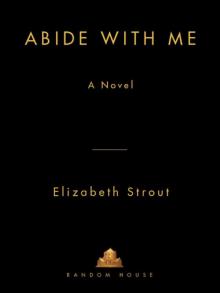 Abide With Me
Abide With Me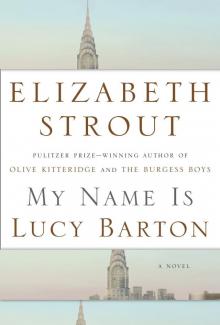 My Name Is Lucy Barton
My Name Is Lucy Barton Olive Kitteridge
Olive Kitteridge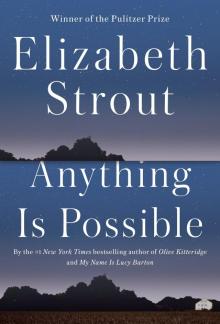 Anything Is Possible
Anything Is Possible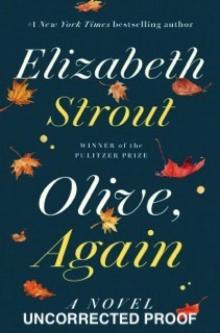 Olive, Again (ARC)
Olive, Again (ARC)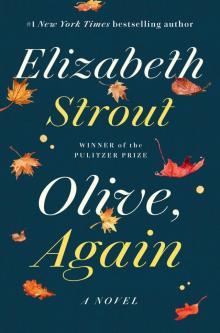 Olive, Again
Olive, Again